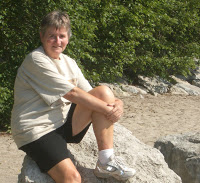Mom read to us kids with expression she had developed in high school drama. The five of us liked our introduction to children’s literature and to poetry—especially the poems she had memorized—and others she read out of books. It took a long time for me to start reading much on my own although I did like books, studying the pictures, reading the captions, and sometimes reading paragraphs. Still I didn’t read many books for myself until 8th grade when I discovered historical fiction, chapter books in story form. I soon became addicted to reading stories, a practice that continued uninterrupted until about age 42 when I went on a book fast. For a year I determined not to read any whole books.
My confession: During my fast I did re-read one favorite novel (perhaps Leslie Marmon Silko’s Ceremony) and then allowed myself one new novel (probably on a gay theme).
My success: I turned my free time into piano practice.
My practicality: I still consulted books when I had to teach a class or preach a sermon.
My learning: I already knew enough about the topics I was teaching so began relying more and more on my memory.
Perhaps I had read just too many novels beginning in junior and senior high school, during five years of undergraduate school, during three years of graduate school, and during two and a half years of graduate seminary. None of these books were required reading but they probably did help me keep balance in my life. I read many international books in translation thus broadening my view of the world. I read novels between semesters and years of schooling. I read on family vacations. Plus I read every assigned book and textbook and many more related to my studies.
I’m still at my reading although my practice has changed. I’ve added memoir to my list, also books about writing. I read quite a few books about visual arts as well, but now I spend more time writing and doing visual art projects. (Well I AM retired.) I’m reading books I borrow from several libraries, buy at bookstores, receive from family members, or find at ARC; and I keep reading and revising stories I have written. In my retirement I don’t read five books a week anymore but I often am reading five books at a time. In short, I continue my almost life-long practice of reading, and I love it.
Over the past several weeks I have been reading and re-reading Phillip Lopate’s To Show and To Tell, a fine book on essay writing. Lopate teaches non-fiction writing in the graduate program at Columbia University, NYC. On Tuesday I read through his very long suggested reading list and noted Benjamin Franklin’s Autobiography. On Wednesday I stopped by a used books store and was surprised to find the book on their shelves. Now I’m reading it, tickled by its style, intrigued by its information, analyzing its writing given what I’ve been learning from Lopate and other teachers, and taking note of how one of the founders of our country understood what he was doing. I never expected to read such a book but am so pleased I knew about it, stopped to look through it, and paid the five dollar price. I’m still reading. This book may take awhile.
© 6 November 2017
About the Author
Phillip Hoyle lives in Denver and spends his time writing, painting, and socializing. In general he keeps busy with groups of writers and artists. Following thirty-two years in church work and fifteen in a therapeutic massage practice, he now focuses on creating beauty. He volunteers at The Center leading the SAGE program “Telling Your Story.”
He also blogs at artandmorebyphilhoyle.blogspot.com

